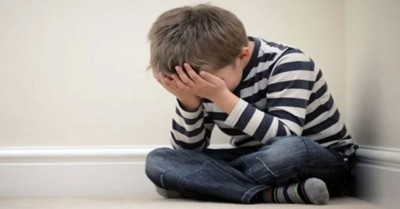Anxiety is one of the most common reasons why children don’t want to leave home and their families. If not addressed at the right time, it can worsen into a debilitating condition, seriously affecting learning too. The following article provides information on identifying and supporting children with anxiety.
Learn To Identify
Early childhood brings with it innumerable unfamiliar situations which can act as stressors. While a certain degree of worry is to be expected at, for instance, watching family leave at the school gate or having a classmate take away a favourite seat, it is when worry becomes overwhelming, going so far as to prevent a child from participating in future experiences that it can become a cause for concern.
Also, different children may present anxiety-related symptoms differently, from heads and tummies that hurt to trouble concentrating in class and even aggressive behaviours. Then again at times a child acting out may just be tired or have a stuffy nose. So perhaps the first step is to identify which behaviours signify anxiety before you can take steps to support someone who needs help.
Understand What Is Happening
When presented with a stressful situation, the body goes into a fight or flight mode – each of which is an evolutionary strategy to cope with danger. When the brain is unable to properly gauge the seriousness of the situation – or lack thereof – it can respond with highly exaggerated or prolonged worry. Thus while one kid may be able to deal with being poked by a mate, for another kid the brain may automatically set off alarm bells. In such situations, injunctions like ‘Keep calm’ or ‘Just relax’ are unlikely to work since he or she is not being anxious on purpose.
Regulated Breathing
Deep breathing helps with anxiety as it slows the breathing process, in turn lowering the heart rate and calming the frantic brain. Lead your class, including the anxious kid, in a breathing exercise while slowly counting or moving your arms up and down. Such breathing exercises as a class will not only help an anxious kid or two but in general soothes frayed tempers or tired minds.
Time Out
If you notice a student especially struggling, it may help to remove him or her from the stress-inducing context. You can for example ask the kid to go out for a quick jog around the playground or lend the gardener a hand in watering the plants. A purposeful activity can take the kid’s mind off anxious thoughts just as a bout of physical exertion can help one wind down.
Make Coping Strategies Part Of Daily Learning
Ideally, integrate certain coping skills in everyday learning practices. You can for example begin the day with certain mindfulness or deep breathing exercises or slow deliberate chants. Then again if there are certain general triggers like a class competition or a group activity that tend to make kids anxious, a few anchoring activities can help them to stay in the present or focus on the task at hand instead of giving in to fears. Finally have open, age-appropriate conversations around mental health and designate safe spaces so that kids know it is alright to feel anxious at times and that they can always ask for help.
Further Reading
Separation Anxiety In Babies and Toddlers - the following article provides information on What Is Separation Anxiety, Factors that Can Cause Separation Anxiety, Separation Anxiety Signs, How To Manage Separation Anxiety When To Seek Help and more.
Supporting Families With Separation Anxiety In Childcare - The following article provides information on Dealing With Separation Anxiety, Orientation Programs, Supporting Parents and Children With Separation Anxiety and more.
Calm Down Box For Children - The following article provides a list of self-regulates that can be included inside a calm down box.
Reference:
Anxiety In Children, NHS UK







 As an Educator in Australia, your pay rate falls under the Children’s Services Award 2010. This award states the minimum amount that an employer can
As an Educator in Australia, your pay rate falls under the Children’s Services Award 2010. This award states the minimum amount that an employer can When working as a qualified Early Childhood Teacher (with a university degree) within a service, your rate of pay will come from the Educational Services
When working as a qualified Early Childhood Teacher (with a university degree) within a service, your rate of pay will come from the Educational Services When working as a Diploma Qualified Educator your pay rate is from the Children's Services Award 2010. This Award states your minimum rate of pay
When working as a Diploma Qualified Educator your pay rate is from the Children's Services Award 2010. This Award states your minimum rate of pay When working as a Cert 3 Qualified Educator, your pay rate is from the Children's Services Award 2010. This Award states your minimum rate of
When working as a Cert 3 Qualified Educator, your pay rate is from the Children's Services Award 2010. This Award states your minimum rate of Educational Leaders play a crucial role in their early childhood service by ensuring that the educational program aligns with best practices and supports the holistic
Educational Leaders play a crucial role in their early childhood service by ensuring that the educational program aligns with best practices and supports the holistic In early childhood education and care, ratios are more than a technicality—they are a frontline safeguard. Every child deserves responsive supervision, emotional connection, and developmental
In early childhood education and care, ratios are more than a technicality—they are a frontline safeguard. Every child deserves responsive supervision, emotional connection, and developmental With the new national child safety reforms kicking in on 1 September 2025, early childhood services like yours have a real opportunity to lead the
With the new national child safety reforms kicking in on 1 September 2025, early childhood services like yours have a real opportunity to lead the Here’s a comprehensive Mobile Phone and Smart Watch Policy tailored for early childhood education and care (ECEC) services in Australia, aligned with the latest 2025
Here’s a comprehensive Mobile Phone and Smart Watch Policy tailored for early childhood education and care (ECEC) services in Australia, aligned with the latest 2025 The Sea of Fish Challenge is a national initiative that invites children, educators, families, and communities to create and display fish artworks as a symbol
The Sea of Fish Challenge is a national initiative that invites children, educators, families, and communities to create and display fish artworks as a symbol Across the early childhood education and care sector, educators are sounding the alarm: current staffing ratios are insufficient to deliver safe, meaningful, and developmentally appropriate
Across the early childhood education and care sector, educators are sounding the alarm: current staffing ratios are insufficient to deliver safe, meaningful, and developmentally appropriate


